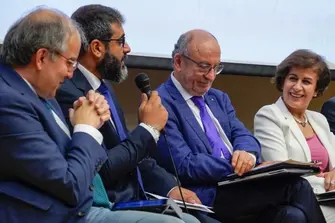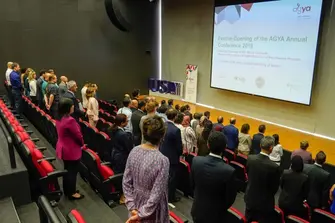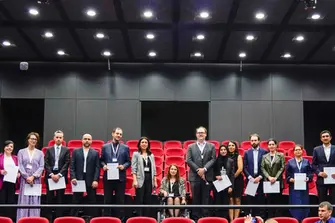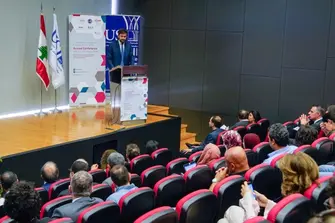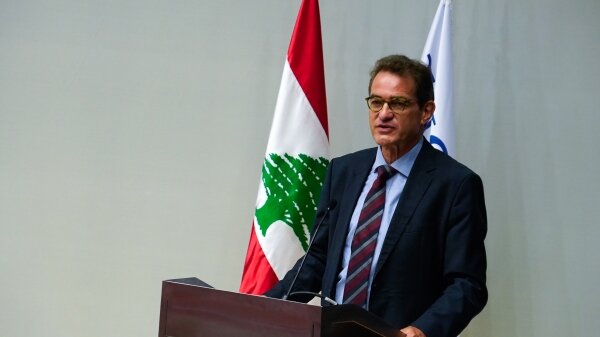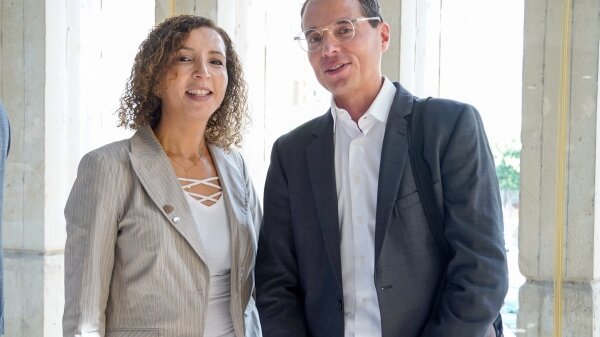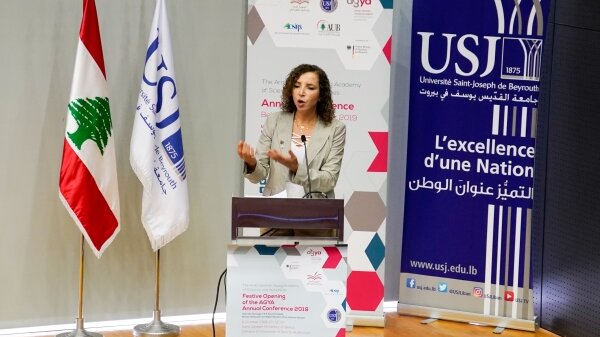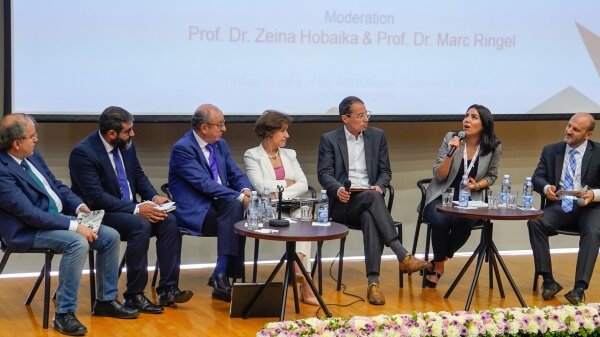'Preparing for the Future: Innovative Concepts in Higher Education Systems'
'Preparing for the Future: Innovative Concepts in Higher Education Systems'
Panel Discussion
This year's AGYA Annual Conference kicked off with a festive opening event at the renowned University Saint Joseph of Beirut (USJ). On this solemn occasion, AGYA Co-Presidents Prof. Dr. Zeina Hobaika and Dr. Jan Friesen warmly welcomed Dr. Ferial Khaddage, Lebanese Ministry of Education and Higher Education, H.E. Dr. Georg Birgelen, Ambassador of the Federal Republic of Germany, Prof. Dr. Dolla Karam Sarkis, Vice-Rector for Research, USJ, and Mr. Ziad Mikati, Mikati Foundation & AGYA Advisory Board Member, who provided inspiring welcome speeches addressing the importance of embracing innovative technologies and interdisciplinary approaches in the field of education and higher education and the relevance of initiatives such as AGYA in enhancing cross-disciplinary Arab-German and Arab-Arab research collaboration.
In order to discuss smart and feasible solutions of embracing innovative technologies and interdisciplinary approaches right away, the public panel discussion 'Preparing for the Future: Innovative Concepts in Higher Education Systems' moderated by AGYA Co-President Prof. Dr. Zeina Hobaika, University Saint Joseph of Beirut, and AGYA member Prof. Dr. Marc Ringel, University of Nuertingen-Geislingen, Germany, brought together several high-ranking representatives from the fields of research and education in different Arab countries and Germany. Within this group of experts, the panelists
- Dr. Ziad Najem, CEO of the KFAS Academy, Kuwait
- Prof. Dr. Mouïn Hamzé, Secretary General of the National Council for Scientific Research, Lebanon
- Dr. Pablo Michael Zerm, Managing Director of Jacobs University Bremen, Germany
- Prof. Dr. Habib Fardoun, Director of the Observatory Unit for Academic Standards and Excellence, King Abdulaziz University, Jeddah, Saudi Arabia, and
- Dr. Nidal Idlebi, Chief of the Innovation Section at the United Nation Economic and Social Commission for Western Asia, UN-ESCWA, Lebanon
discussed the current state of higher education in the Arab region and Germany as well as challenges and requirements for the entrance into the digital age.
The Importance of Embracing the Digital Challenge
Digital technologies form an essential part of our lives today. They are changing the way we communicate, work, learn and network and thereby have a profound impact on societies and economies. Hence, digital transformation is not just about embracing a new technology, it significantly affects the way we organize life and learning. Schools and universities as providers of education and skills are therefore at the core of transformation. Yet, despite the technological potentials and the general openness of education systems towards innovation, the digitalization of education faces many challenges and still seems to be at its beginning. The reasons for this are manifold, one of which lies in the relative conservativeness and inertia of the educational apparatus despite the willingness for innovation on many individual levels. It goes without saying that innovation is not merely the introduction and use of new technologies but necessarily reaches out into the re-evaluation of contents and knowledge transmission.
The Gap between Higher Education and the Market
Large scale change does not come without a political agenda and the mutual agreement of both policy makers and educational institutions. The needs of the labor market must be included in this process and therefore close exchange with potential employers from the public sector and especially the private sector is necessary. The gap between the skills that higher education institutions currently provide and the needs of the labor market is considerable and must be reduced. This is important both on an individual and on a national level as it provides access to the national, regional and global markets. The core problem is the lacking dialogue between the universities and the private sector and hence the difficulties in identifying the latter's real needs in research. This leads to an asynchronous situation between education and market, a challenge that needs to be overcome in order to provide job opportunities, prevent massive brain drain and sustain the local economies. In consequence, a bigger effort is needed from both sides. A model that links theory and practice, university and market and proved very successful in Germany is the cooperative university ('Duale Hochschule'). Nevertheless, the functionality depends largely on the environment and needs both patience from the side of the industry and an extra effort from the students. 'The industry needs to invest more time and money and the students more effort as they work and study at the same time', concludes Dr. Pablo Michael Zerm.
Innovation Needs a Favorable Environment
The panelists agreed that the Arab countries were not keeping up with the latest developments. One major problem is that 'our universities are not targeting jobs, but degrees', states Prof. Dr. Mouïn Hamzé regarding the situation in Lebanon. From the currently roughly fifty universities only three can be considered research universities. The same applies to the situation in other Arab countries. What follows from that? Innovation can only be cultivated when there is space for research. Hence, a better and more conducive environment at the universities is needed, points out Dr. Nidal Idlebi. Innovation needs 'collaboration, discussions, team work, and interdisciplinary approaches', she says. Of course, it also needs the space for failure and improvement. None of this is currently provided in a systematic way. How about the balance between knowledge transfer and skill training? Whereas in Saudi Arabia higher education primarily aims at teaching problem solving and the interpretation of results as pointed out by Prof. Dr. Habib Fardoun, the importance of solid knowledge transfer is emphasized by the other panelists. 'Knowledge transfer is still a priority. Skill training alone will not be sufficient for innovation' remarks Dr. Ziad Najem. One of the main challenges therefore is to be agile and to develop the capacity of adapting to the rapid change that is taking place at an ever-accelerating pace. Lifelong learning is certainly a key skill that is required to face these challenges.
Education 4.0 and Digital Citizenship
In view of today's massive amount of available information and the technology to access and filter it, the structure of the education system needs to be revisited. One problem is that the university programs cannot change so fast. This applies not only to the Arab countries, but the question on how to prepare students for an unknown future is also a main concern in higher education in Germany as pointed out by Dr. Pablo Michael Zerm: 'We have to teach our students digital literacy and proficiency and prepare them for decision making, critical thinking and responsibility.' Building on that, Dr. Ziad Najem argues for the revision of the judgmental vocabulary currently in use: 'Our education system should recur less to 'correct and incorrect' and move more towards 'justified and unjustified' answers to encourage critical thinking and push the boundaries further.'
Another important task is the necessary shift from passive users to active producers in the field of technology. This can only be achieved through the support of research and innovation at university level and a strong relationship between universities and the private sector. Digital citizenship or the practice of using the internet and technology safely, respectfully and responsibly seems to be more advanced in the Gulf region, not least due to a considerable percentage of international and internationally trained staff. In Lebanon, the situation is entirely different despite many efforts, states Dr. Nidal Idlebi.
Sustainability
To be sustainable, innovative approaches such as artificial intelligence need to be connected to the local environment and developed in collaboration with its universities. As a purely imported technology it will not be sustainable. Furthermore, the beneficial aspects of artificial intelligence for the community and its 'human side' need to be highlighted to raise acceptance. To make any such initiative sustainable and forward-looking, not only the connection to the environment is vital but also the constant evaluation of the process. Innovative concepts in higher education therefore need to intelligently combine solid knowledge transfer, skill training and technology.
The AGYA Annual Conference in Beirut took place from 11-14 October 2019, and was held in cooperation with the Ministry of Education and Higher Education of the Lebanese Republic, the National Council for Scientific Research (CNRS), Saint Joseph University of Beirut (USJ) and the American University of Beirut (AUB).
Date and Venue
11 October 2019
American University of Beirut (AUB), Lebanon
